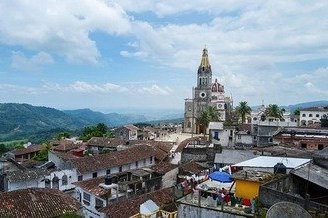Mexico
Cuetzalan
Cuetzalan is a town located in the Sierra Norte mountains.
It is characterised by steep cobblestone streets and an architecture that reflects indigenous traditions and living in the mountains. The natural environment around the town includes extensive forests, numerous waterfalls and caverns.
Site Info
Official Information
- Full Name
- Cuetzalan and its Historical, Cultural and Natural Surrounding (ID: 5077)
- Country
- Mexico
- Status
-
On tentative list 2006
Site history
History of Cuetzalan
- 2006: Added to Tentative List
- Added to tentative list
- Type
- Mixed
- Criteria
Links
- UNESCO
- whc.unesco.org
All Links
UNESCO.org
- whc.unesco.org — whc.unesco.org
Community Information
- Community Category
- Natural landscape: Forest
- Urban landscape: Latin American
Travel Information
Recent Connections
News
No news.
Community Reviews
Show full reviews
Cuetzalan or Cuetzalan del Progreso – site visited in February, 2024.
On a map it looks as nice stopover while travelling from Mexico City to El Tajin. It is a bit more than 300 km from MEX airport but since the roads are not perfect and you drive partly through the mountains it took around 8 hours to get there (instead of 5 - 6 as shown in navigation). In fact it was one of the worst road I have encountered in Mexico (so many holes in asphalted roads, speed bumps while driving through populated areas – some of them require speed of 10 km/h and they not always marked). All in all not recommended to get there in the night.
Cuetzalan is a small town located in mountainous region of Sierra Norte. It was proclaimed Pueblo Magico (Magical Town) in 2002 - Mexican idea to promote small historical and heritage towns including those already on UNESCO list like Tequila, Tepotzotlán (Camino Real), Tepoztlán (Popocatepetl monasteries), Jalpan de Serra (monasteries of Sierra Gorda) or Pabellón de Hidalgo (Camino Real). And Cuetzalan is no exception. Historic center is quite picturesque full of cobbled streets and old stone houses covered with red tiles. Daily life is focussed on market square (Zocalo) where municipality buildings are located and numerous trading posts with local craft, souvenirs and food. There is also a big church (Parroquia de San Francisco de Asís, interior is visibly of XIX century) and a huge pole for ancient …
Keep reading 0 comments